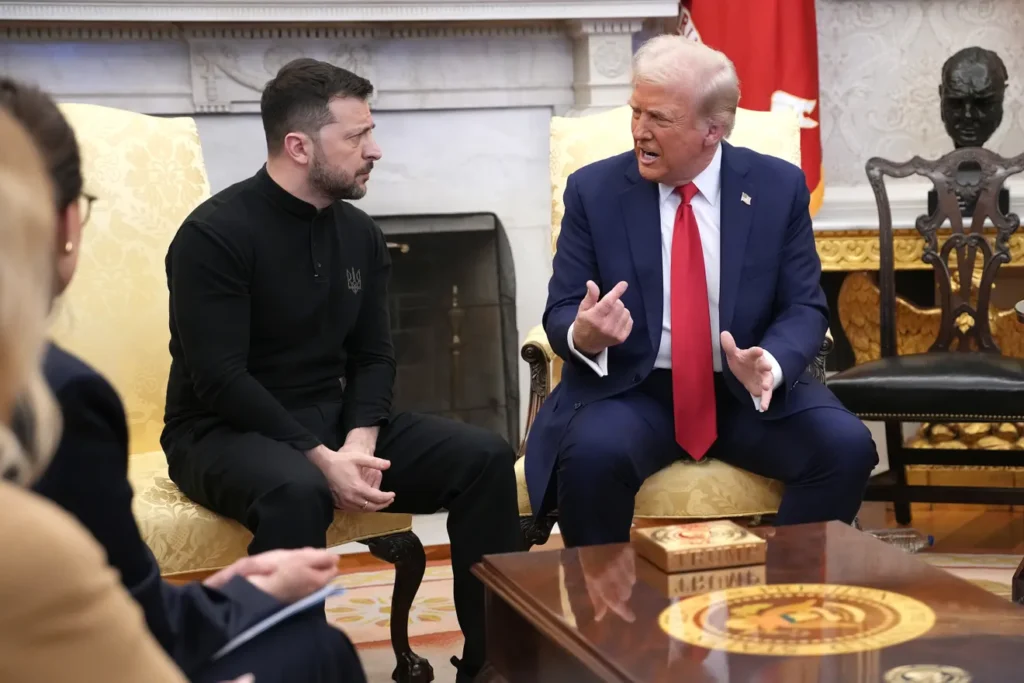LONDON — President Donald Trump on Wednesday blamed Ukrainian President Volodymyr Zelenskyy for prolonging the war in Ukraine, arguing that Kyiv’s refusal to consider territorial concessions—especially regarding Crimea—is fueling continued bloodshed and stalling potential peace talks.

Trump’s criticism followed Zelenskyy’s blunt dismissal on Tuesday of any proposal that would see Ukraine cede territory to Russia, including the annexed Crimean Peninsula, as a condition for entering peace negotiations. “There is nothing to talk about. It is our land, the land of the Ukrainian people,” Zelenskyy said, ahead of a round of U.S.-led talks in London aimed at negotiating a ceasefire.
“Very harmful,” Trump wrote on social media in response to Zelenskyy’s firm position. “Nobody is asking Zelenskyy to recognize Crimea as Russian territory. But if he wanted Crimea, why didn’t they fight for it eleven years ago when it was handed over to Russia without a shot being fired?”
Behind the scenes, a proposal drafted by U.S. officials and presented during talks last week in Paris reportedly included provisions that would allow Russia to retain control of occupied Ukrainian territory. According to a senior European official familiar with the discussions, the plan was initially introduced as “just ideas,” but later characterized by Washington as final—leaving Ukrainian officials blindsided.
Vice President JD Vance echoed Trump’s position during a visit to India, saying the time has come for Ukraine to either accept the American proposal or for the United States to “walk away from this process.”
“We’ve issued a very explicit proposal to both the Russians and the Ukrainians. It’s a very fair proposal that would freeze the territorial lines close to where they are today,” Vance said, without offering specific details on the plan.
Trump, who has long maintained that he could end the war swiftly, claimed Ukraine is risking total collapse by resisting negotiation. “Zelenskyy can have peace, or he can fight for another three years before losing the whole country,” Trump warned. “This will do nothing but prolong the killing field, and nobody wants that.”
Even as world leaders and negotiators met in London, violence continued along Ukraine’s sprawling 1,000-kilometer front. On Wednesday morning, a Russian drone strike hit a civilian bus in Marganets, in Ukraine’s eastern Dnipropetrovsk region, killing eight women and one man. Regional governor Serhii Lysak said more than 40 others were injured.
Photos from the scene showed a gutted bus with shattered windows and bloodied glass strewn across the floor.
In response, Zelenskyy reiterated his openness to dialogue—but not at the cost of territorial sovereignty. “We insist on an immediate, complete and unconditional ceasefire,” he posted on social media, invoking a peace framework allegedly put forward by Washington six weeks ago.
Despite growing urgency, Wednesday’s meeting in London was reduced in scope after Secretary of State Marco Rubio abruptly canceled his participation due to scheduling conflicts. The absence of high-level representation raised concerns about the U.S. commitment to its own negotiation process.
Still, Trump’s envoy, retired Lt. Gen. Keith Kellogg, was in attendance, alongside Ukraine’s delegation led by Andrii Yermak, chief of staff to President Zelenskyy. Yermak was joined by Foreign Minister Andrii Sybiha and Defense Minister Rustem Umerov.
“The path to peace is not easy,” Yermak said on social media. “But Ukraine remains committed to peaceful efforts.” He added that Ukraine’s delegation would push for “a full and unconditional ceasefire as the first step toward a just and lasting peace.”
Later in the day, Yermak reported meetings with national security and foreign policy advisers from what he described as the “coalition of the willing.” He accused Russia of deliberately stalling talks, stating: “Russia continues to reject an unconditional ceasefire, dragging out the process and trying to manipulate negotiations.”
The notion of Ukraine trading territory for peace has divided Western allies. While some European leaders are reportedly warming to the idea of freezing the conflict along current front lines, others remain cautious, fearing that rewarding Russian aggression sets a dangerous precedent.
“There’s recognition that Russia is now deeply entrenched in at least five regions—Crimea, Luhansk, Donetsk, Zaporizhzhia, and Kherson,” said a senior French official, speaking anonymously per French presidential policy. “If the goal is a ceasefire now, it must be based on the line of contact as it is.”
Despite Trump’s repeated campaign pledges to end the war “in 24 hours,” progress has stalled. U.S. special envoy Steve Witkoff is expected to return to Moscow later this week for additional talks. Kremlin spokesman Dmitry Peskov said that while discussions with U.S. officials are ongoing, key disagreements remain unresolved.
Trump has grown increasingly impatient with both sides. While he has criticized Putin’s reluctance to accept U.S. proposals, he has reserved his sharpest attacks for Zelenskyy, accusing him of intransigence and misjudgment.
“The longer Zelenskyy refuses to negotiate, the more Ukraine risks losing — not just land, but its future,” Trump said in another social media post. “The time for peace is now.”



